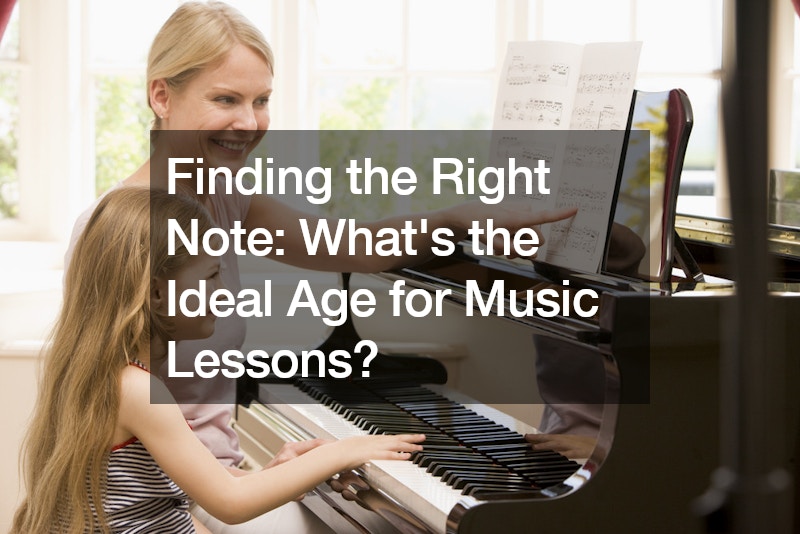The question of when to start formal music lessons for children is a topic of considerable debate among educators, parents, and musicians alike. Some advocate for starting as early as possible, citing the potential benefits of early exposure to music, while others emphasize the importance of waiting until a child is developmentally ready. In this blog post, we’ll explore this question and consider various perspectives to help parents make informed decisions about their child’s musical education.
The Developmental Perspective
One common consideration when determining the ideal age for music lessons is a child’s developmental readiness. Just as we don’t expect children to start reading before they’ve developed the necessary cognitive skills, it’s important to consider whether a child is ready for the challenges of learning an instrument.
Developmental milestones such as attention span, fine motor skills, and ability to focus are crucial factors to consider.
For example, a child who demonstrates strong fine motor skills and attention to detail may be well-suited for guitar training classes, which require precise finger movements and sustained focus. On the other hand, a child who struggles with maintaining attention or has difficulty coordinating movements may benefit from starting with a simpler instrument like the ukulele or waiting until they’ve further developed these skills before pursuing formal music lessons.
Alignment with Academic Studies
Another perspective to consider is the alignment of music lessons with a child’s academic journey. Some educators suggest that starting music lessons around the age of seven, when children typically begin formal academic studies, can be beneficial.
At around seven years old, children often experience cognitive and developmental shifts that can enhance their ability to engage in structured learning activities. They may demonstrate improved attention span, concentration, and cognitive flexibility, all of which are valuable skills for musical learning.
Furthermore, aligning music lessons with academic studies provides opportunities for cross-disciplinary learning and skill reinforcement. For example, concepts such as rhythm, pattern recognition, and auditory processing, which are fundamental to music education, also have parallels in subjects like mathematics and language arts.
The Suzuki Method
The Suzuki method, developed by Dr. Shinichi Suzuki, is a widely recognized approach to music education that emphasizes early exposure and learning by ear. Advocates of the Suzuki method argue that children as young as two or three years old can begin learning to play instruments such as the violin or piano. This approach aligns with the belief that young children are capable of absorbing information through immersion and repetition, much like how they learn language.
The Waldorf Philosophy
In contrast, the Waldorf education philosophy, pioneered by Rudolf Steiner, places a strong emphasis on nurturing the holistic development of children, with the arts playing a central role. Unlike the Suzuki method, which advocates for early formal music instruction, Waldorf schools typically delay formal music instruction until later years. However, music is integrated into the curriculum from an early age through singing, movement, and hands-on exploration of instruments. This immersive approach exposes children to the beauty and diversity of musical expression while also fostering a sense of joy and creativity.
Individual Interest and Readiness
While both approaches are deemed effective, individual interest and readiness carry more weight when contemplating the appropriate age for music lessons. Children vary greatly in their enthusiasm for music and their developmental readiness to engage in formal instruction. While some youngsters display a natural affinity for music from an early age, eagerly tapping out rhythms or singing along to melodies, others may exhibit less overt interest or readiness due to factors such as temperament, exposure, or developmental stage.
Observation and attunement to a child’s cues are crucial in determining their readiness for music lessons. Parents should observe their child’s spontaneous musical interactions, noting signs of enjoyment, curiosity, and persistence. A child who frequently gravitates towards musical activities, such as experimenting with different sounds, mimicking rhythms, or expressing a desire to learn an instrument, may be indicating a readiness to take formal music lessons. Conversely, a child who shows limited interest or becomes easily frustrated by musical tasks may benefit from additional time to explore and develop their musical inclinations at their own pace.
Balancing Skill Development and Enjoyment
Finding the right balance between skill development and enjoyment is key to ensuring a positive musical experience for children. While early exposure to music can lay the groundwork for future proficiency, it’s equally important for children to derive joy and fulfillment from their musical pursuits. Parents should prioritize creating a supportive and nurturing environment where their children can explore and express themselves through music.
Final Thoughts
There is no one-size-fits-all answer to the question of when to start formal music lessons for children. Factors such as developmental readiness, educational philosophy, individual interest, and enjoyment all play a role in determining the ideal age for music lessons. By considering these perspectives and observing their child’s unique needs and interests, parents can make informed decisions that support their child’s musical journey. Ultimately, the goal is not just to create proficient musicians but to instill a lifelong love and appreciation for music.
.

